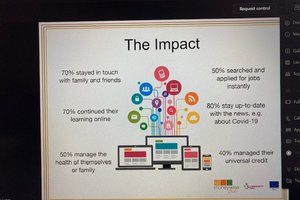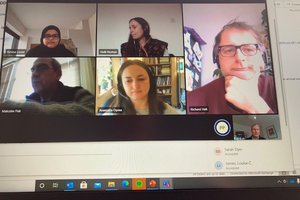The latest in our series of #BBBYouth welfare webinars took place on Tuesday and 2nd March 2021. The session was chaired by Kieran Breen, CEO of Leicestershire Cares, and guest speakers were:
Professor Richard Hall, Centre for Urban Research on Austerity, Centre for Computing and Social Responsibility, De Montfort University.
Professor Malcolm Fisk, Professor of Ageing and Digital Health, School of Computer Science and Informatics
Peter Paduh, Chairman of SocialBox.Biz – A new generation Social Impact consultancy – with emphasis on digital inclusion, tech innovation and integration of refugees and homeless people
Amina Lunat, Project Coordinator, Moneywise Plus – distributing digital equipment to those in need in Leicestershire.
A wide ranging discussion covered point such as, the digital divide is an extension of entrenched inequalities and divides, the solutions are not just technological, sensitive culturally appropriate support is needed for families who lack digital competence.
The Institute for Fiscal Studies reported in the first lockdown that digital access was starkly divided, with schools with the highest levels of socio-economic deprivation having less access to online classes, video chat, and interactivity, and being more likely to require home-learning packs
Moneywise plus project shared how people with IT skills could get involved in their work supporting people to develop digital skills. SocialBox.Biz let people know they can upgrade old laptops and pass them onto to people who are digitally excluded.
In a lively Q&A session, participants felt more should be done by government to ensure people had digital access and support. It was also noted that todays young people are tomorrow’s older people and they may well find themselves in a time when technology has left them behind.
There were a lot of questions about people having to access support and services online and how lots of the digital interfaces assumed you were accessing via a laptop rather than a mobile phone. Teaching staff also raised how parents who were not digitally competent could feel embarrassed by this and more needed to be done to reach these people.
There was strong agreement with the statement:
In the twenty first century digital access should be a right and not a privilege
Closing the meeting Kieran Breen noted;
The lockdown had clearly demonstrated we cannot allow people to be digitally excluded in the same way we would not let them live in houses without electricity or running water
For more information on Moneywise Plus https://www.moneywiseplus.co.uk/
How to donate old laptops https://www.leicestershirecares.co.uk/about-charity/news-events/recycle-and-upskill-easy-win-win/



